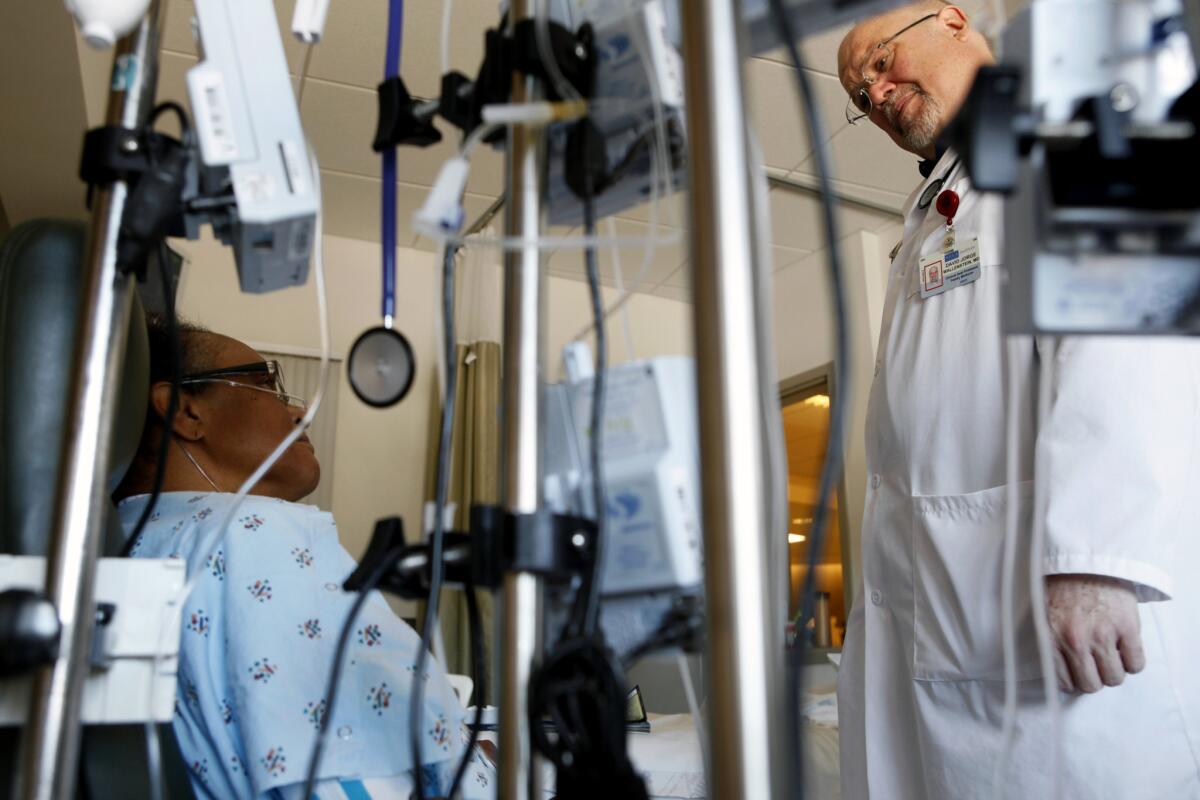More in U.S. say doctors should try to save lives, no matter what

A surging share of Americans believe that doctors should do everything possible to save a life despite concerns over the costs and consequences of such intensive care.
The new survey, released Thursday by the Pew Research Center, surprised doctors and bioethicists who have advocated for physicians and families to carefully weigh aggressive medical treatments for patients near death.
Invasive procedures may not lengthen or improve life for the chronically ill, they warn. Many Americans agree with them: Two out of three people believe there are some situations in which a patient should be allowed to die, the survey found.
However, the percentage of Americans who say physicians should always do everything possible to save a life has more than doubled between 1990 and 2013, vaulting from 15% to 31%. Far fewer people offer no opinion than in the past.
When asked about their own lives, 20% said doctors should do everything possible to save them, even if they had an incurable disease, were in great pain, were totally dependent on someone else for care or had trouble doing day-to-day activities. An additional 46% said they would want doctors to stop their treatment in some of those cases, but not others.
At the same time, Pew found that a growing share of Americans believe that people suffering severe pain or living with an incurable disease have the moral right to end their own lives. This spring, 62% of adults surveyed said that someone in “a great deal of pain” has a right to commit suicide. Only 55% said the same in 1990.
“It’s a puzzle,” said Cary Funk, senior researcher with the Pew Research Center. But as the complicated results of the survey show, “beliefs about end-of-life treatment tend to be complex.”
The findings do have one thing in common: Patients want more control over their care, as the pendulum swings away from doctors having all the power, said Paul L. Schneider, president of the Southern California Bioethics Committee Consortium.
Doctors and patients should ultimately share decisions, Schneider said, but some physicians are reluctant to argue with their patients or tell them continuing treatment is futile.
As physicians, “very commonly we find ourselves doing aggressive care at the request of patients and families and shaking our heads when we walk away, wondering whether we’re doing the right thing,” Schneider said. “This points to a growing gap between where the public is and where many doctors are.”
At the same time, some doctors may opt for aggressive treatments simply because of “inertia,” said Jonathan Bergman, UCLA assistant professor of urology and family medicine.
“That reflects a failure of the medical community to have honest and difficult conversations with patients,” Bergman said. “When we explain things to patients ahead of time, they often choose not to have a very aggressive intervention.” That, paradoxically, can help them live longer, he added.
Less educated people are more likely to think doctors should do everything possible to save a life, no matter the circumstances, Pew found. So are Latino and black Americans, as well as younger people and those who have not given much thought to their end-of-life wishes.
But Pew found that across the board, the belief has grown more common. Schneider believes the trend is tied, in part, to diminished trust in doctors. Excitement about new medicines may have also fueled the belief that physicians should try any treatment they can, even when chances seem slim: Pew found that people with more confidence in new medicines and treatments are more likely to think doctors should always try everything possible.
The Pew Research Center survey was conducted this spring and included nearly 2,000 adults who were interviewed by telephone, including cellphones and land lines, in English or Spanish. Other findings from the survey included:
--Americans remained divided about whether physicians should be able to assist terminally ill patients in committing suicide, with 47% in favor and 49% opposed. Latinos and black Americans disapprove more strongly than whites, with 65% opposing laws that allow the practice.
--Nearly half of adults said they had a family member or close friend in a coma or facing a terminal illness in the last five years, and more than a fifth had been faced with the question of whether to halt aggressive treatment for that person.
--Beliefs about end-of-life care and suicide differed by religion and by race. For instance, 80% of white Catholics said there are situations when a patient should be allowed to die, compared with only 32% of Latino Catholics. Among Protestants, 76% of white mainline Protestants, 68% of white evangelicals and 41% of black Protestants offered the same opinion.
ALSO:
Illinois becomes latest state to approve same-sex marriage
Prosecutor: Supremacist targeted by ally’s graffiti after DNA test
Despite Albuquerque defeat, antiabortion activists vow to continue
More to Read
Sign up for Essential California
The most important California stories and recommendations in your inbox every morning.
You may occasionally receive promotional content from the Los Angeles Times.











